‘Sustainability and Corporate Responsibility’ seminar 2023
The Centre for Entrepreneurship and Sustainability (CES, College of Business, Arts and Social Sciences, Brunel University London) presents the seminar on ‘Sustainability and Corporate Responsibility’. Please join this free event to hear from our lab leaders, and from distinguished speakers and practitioners. This is part of the Brunel Research Festival, a month-long celebration of the diverse local and global benefits of our research. Explore the full programme at brunel.ac.uk/BRF
Panel discussion
Dr Monomita Nandy, Professor Dorothy Yen, Dr Marios Samadanis
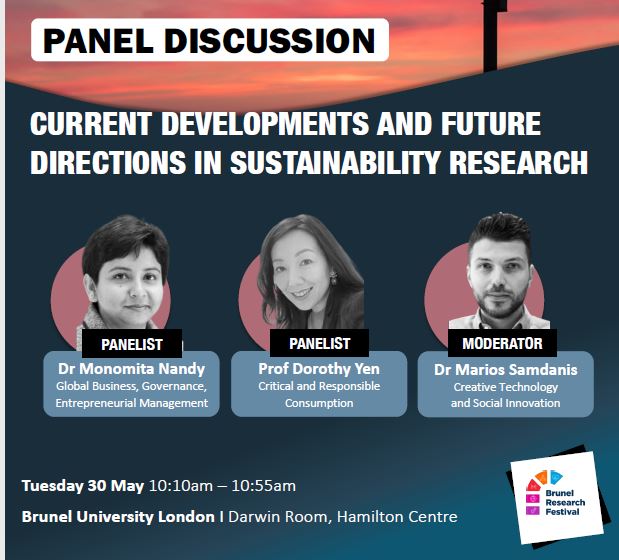
Keynote speakers
Nigel Morgan
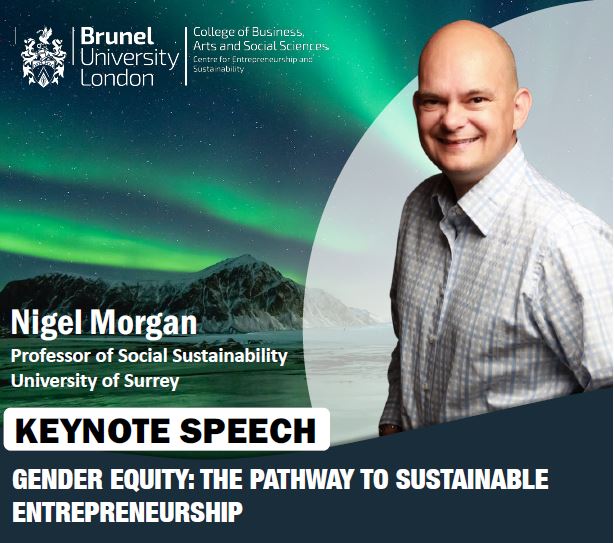
Jeremy Galpin
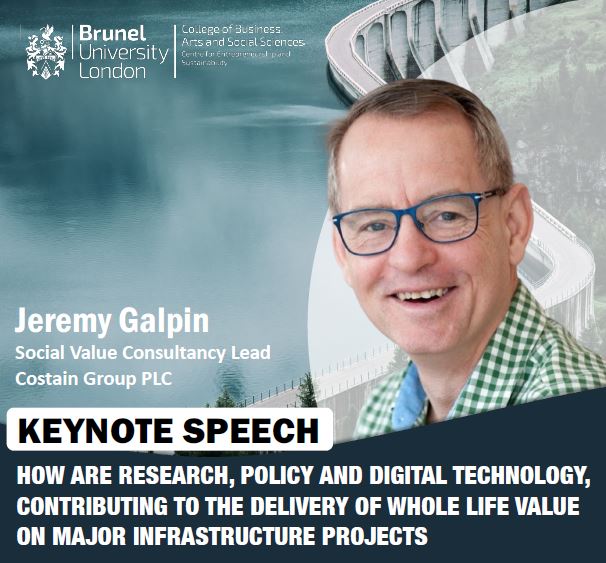
Programme
09:45 Arrival, Coffee & Tea – Hamilton Centre, Darwin Room
10:00 INTRODUCTION TO THE CES
- Dr Marios Samdanis (Deputy Director of the Centre for Entrepreneurship and Sustainability)
10:10 PANEL DISCUSSION: Current developments and future directions in sustainability research
- Prof Dorothy Yen (Lab Leader: Critical and Responsible Consumption)
- Dr Monomita Nandy (Lab Leader: Global Business, Governance, Entrepreneurial Management)
11:00 KEYNOTE SPEECH: RESEARCH PRESENTATIONGender equity: the pathway to sustainable entrepreneurship
12:00 KEYNOTE SPEECH: POLICY PRESENTATION: How is research, policy and digital technology, contributing to thedelivery of whole life value on major infrastructure projects
- Jeremy Galpin (Social Value Consultancy Lead, Costain Group)
CBASS Grant Writing Workshop: 17 May 2022
This workshop provides information and hands-on support for CBASSacademics who are interested in applying for medium-to-large researchcouncil grants.
Date and time: 17 May 2022, 9:30am – 3:30pm
Venue: Eastern Gateway Room 003a
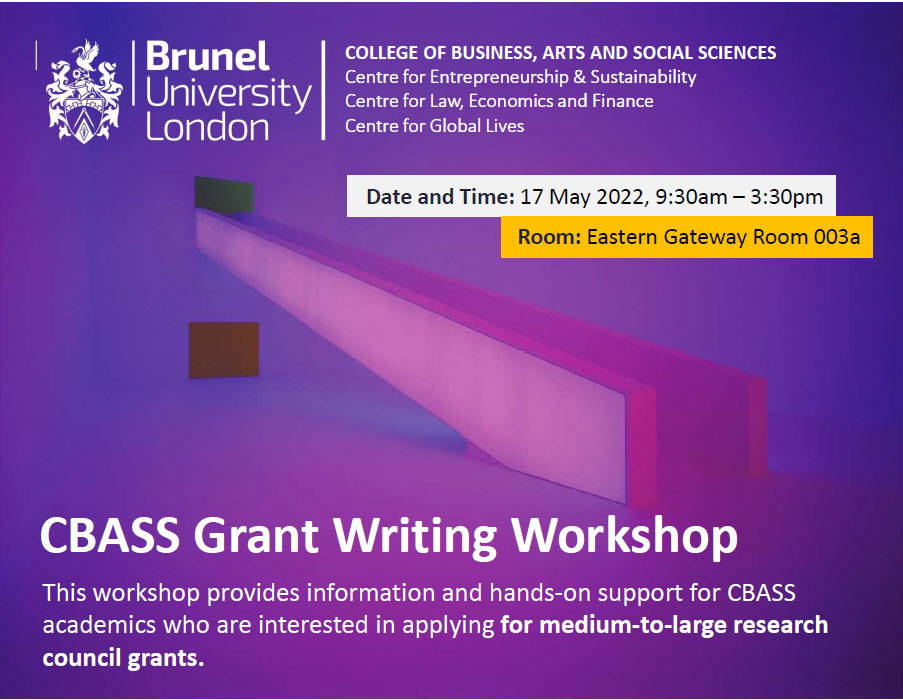
CES Conference 2022 "Sustainability and Corporate Responsibility" : 23 March 2022
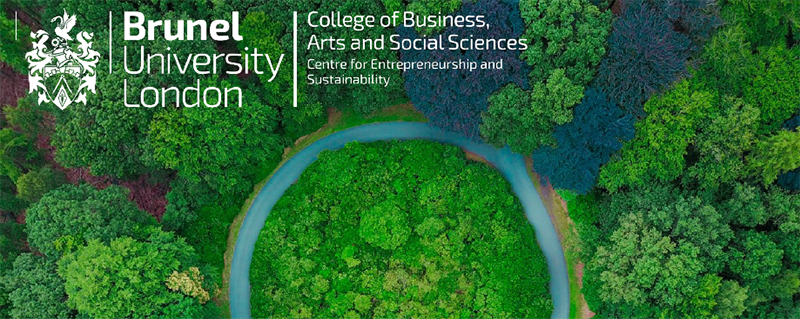
Is it Vegan? Ethical enrolment and exclusion in digital food systems
Brunel University—Sustainability Politics research seminar series

Eva Giraud (University of Sheffield, Sociology)
23rd March, 3pm,
Zoom, 23 March, 3pm: https://bruneluniversity.zoom.us/j/4624210504
Meeting ID: 462 421 0504, Passcode: 629123094
Download a brochure
Abstract
Over the past decade, possibilities for ethical food practice to serve as a lever for systemic change have been eroded: as illustrated by the popularization of veganism. In western Europe, vegan practice has shifted from something marginal into the mainstream, with fast-food franchises offering vegan options and supermarket chains dubbing ‘flexitarianism’ the future of food. Yet what are the implications of radical expressions of food politics becoming enrolled into infrastructural arrangements they have historically lain at odds with?
Feminist STS elucidates that when publics move from being non-users of socio-technical systems to being enrolled by these systems, it can become difficult to explore whether oppressive norms and standards could be ‘otherwise’. Interviews with long-term vegans and analysis of vegan digital media ecologies (including social media platforms, commercial food ordering systems and apps such as ‘is it vegan’) illustrate these tensions. As large food manufacturers and restaurant chains have adapted their ordering systems, technical organisation, and supply-lines to accommodate plant-based options, vegan practice has become more accessible. At the same time, possibilities for maintaining connections between veganism and other social justice issues – particularly environmental and labour politics – are being foreclosed. While digital food infrastructures enrol users by appearing to cater to a range of moral (as well as technical) requirements, in practice the onus is on consumers to be more ethically flexible and fit with infrastructural norms that enact more limited understandings of what veganism is and means. The ethical dimensions of enrolment require elaboration to conceptualize these developments.
Eva Haifa Giraud is a Senior Lecture in Media at the University of Sheffield, UK. Her research has two strands: contemporary non-anthropocentric theory, and understanding how frictions that arise in the relationships between activism, political ideals, and digital media technologies are negotiated. She has published in journals including Social Studies of Science, Theory, Culture & Society and New Media & Society as well as her monographs What Comes After Entanglement? (Duke University Press, 2019) and Veganism (Bloomsbury, 2021).
Dismantling the Machine: Rethinking Technology in the Anthropocene
Brunel University—Sustainability Politics research seminar series
Alf Hornborg (Lund University, Human Ecology)
Friday 11th February, 2pm GMT
Zoom: https://bruneluniversity.zoom.us/j/4624210504
Meeting ID: 462 421 0504, Passcode: 6291230945
Download a brochure
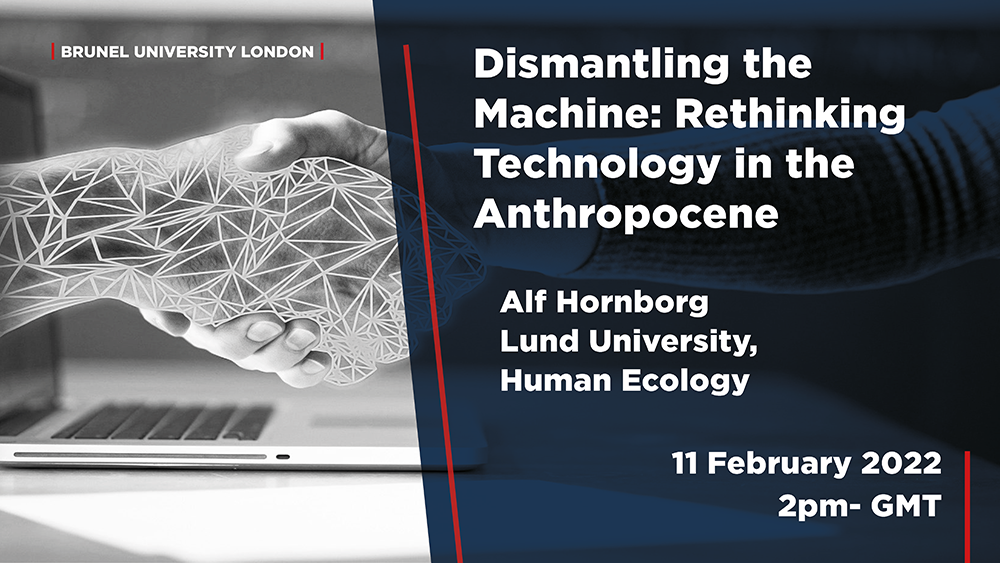
Abstract
Since the Industrial Revolution, both mainstream and heterodox understandings of technological progress have been distorted by the dualistic modern worldview which separates the material from the social. Technologies developed since the late eighteenth century differ from earlier forms of technology by being as dependent on world market prices of labor, land, and other biophysical resources as on human inventiveness. Modern people continue to view technology as ingenuity applied to features inherent in nature, while ignoring the extent to which it is contingent on the asymmetric exchange of resources in global society. An illusion produced by nature/society dualism is that the economy can be understood without knowledge of nature, whereas technology can be accounted for without knowledge of world society. Although inextricably entwined in the real world, the phenomena studied by economics and engineering are kept conceptually separate. This is achieved by disregarding the materiality of world trade. The global predicament of the Anthropocene prompts us to acknowledge that modern technologies are not just instruments for solving problems but social strategies for redistributing time and space in world society, displacing work and environmental loads to sectors of the world-system where wages are lower and environmental legislation less rigorous. It is becoming increasingly evident that the more expensive technologies are, the fewer people will have access to them and the more resources they will require. Technology is not extraneous to social theory. A rethinking of technological progress along these lines finally suggests that the widespread visions of a transition to post-carbon technologies are incompatible with current levels of consumption and energy use in the Global North.
Bio
Alf Hornborg received his Ph.D. in Cultural Anthropology from the University of Uppsala and has taught at Uppsala, the University of Gothenburg, and at Lund University. He has conducted field research in Nova Scotia, Peru, and Brazil. His primary research interest is the cultural and political dimensions of human-environmental relations in past and present societies, particularly from the perspective of world-system analysis. This has led him to explore various perspectives not only from anthropology but also from trans-disciplinary fields such as environmental history, ecological economics, political ecology, and development studies. The central ambition has been to examine how specific cultural assumptions constrain human approaches to economics, technology, and ecology, and how such assumptions tend to serve as ideologies that reproduce social relations of power. His books include The Power of the Machine (2001), Global Ecology and Unequal Exchange (2011), Global Magic (2016), and Nature, Society, and Justice in the Anthropocene (2019).
Closing the Rhetoric-Action Gap on Climate Mitigation: 6 October 2021, 2-3pm (BST)
Prof. JULIAN ALLWOOD Cambridge University, UK FIRES
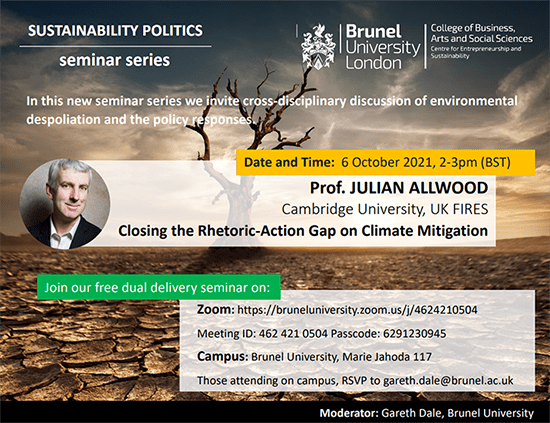
Download a leaflet
Zoom link
Meeting ID: 462 421 0504
Passcode: 6291230945
Campus: Brunel University, Marie Jahoda 117
Those attending on campus, RSVP to Gareth Dale
We are in an era of false hope on climate mitigation: Countries worth 70% of the world’s GDP have pledged to reach zero emissions by 2050 or 2060 but none have a credible delivery plan yet. Most rhetoric today and in the past about mitigation has focused on new energy infrastructure technologies (CCS, Hydrogen, SMR nuclear, negative emissions technologies etc.) but there is no longer time left to deploy them at sufficient scale. Climate policy so far has largely been based on scenarios where energy demand is assumed, and an imaginary supply-side solution is described that would meet this level of demand. In reality, based on recent history and trends of past deployments, we are entering a period of supply restraint - but Covid has shown us that we can adapt to living differently with today’s technologies more readily than previously thought. Based on the analysis of the UK FIRES programme, we can now anticipate the potential for growth in providing services differently while requiring less energy - whether this is via new approaches to shared transport, life-extension as the mainstream activity of manufacturing and construction, and much more. The key policy mechanism that has driven mitigation to date and which will drive it in future is regulation, and we can anticipate the forms this must take to reach zero emissions. Investors and clients are also of increasing importance in driving change, and we are likely to see a rapid shift from discussion of hypothetical future actions that “reduce” emissions, to short-term widely deployable actions that move us rapidly enough to zero emissions.
Julian Allwood is Professor of Engineering and the Environment at the University of Cambridge. He worked for 10 years for Alcoa on flat rolling, before academic positions at Imperial College and Cambridge. His research group develops new manufacturing technologies for metals and strategies to mitigate climate change. From 2009-13 he held an EPSRC Leadership Fellowship, to explore Material Efficiency as a climate mitigation strategy – delivering material services with less new material. This led to publication in 2012 of the book “Sustainable Materials: with both eyes open” which can be read online at www.withbotheyesopen.com and was listed by Bill Gates as “one of the best six books I read in 2015.” Julian was a Lead Author of the 5th Assessment Report of the Intergovernmental Panel on Climate Change (IPCC) with a focus on mitigating industrial emissions. He is an Honorary Fellow of the Institution of Materials, Minerals and Mining, a Fellow of the International Academy of Production Engineering (CIRP) and served as chairman of its metal forming section, a member of the UK’s Energy Research Partnership and for ten years was joint editor-in-chief of the Journal of Materials Processing Technology. He was elected as a Fellow of the Royal Academy of Engineering in 2017. From 2019-24 he is director of UK FIRES – a £5m industry and multi-university programme aiming to explore all aspects of Industrial Strategy compatible with delivering zero emissions by 2050. ‘Absolute Zero’, the first publication of UK FIRES attracted widespread attention including a full debate in the House of Lords in Feb 2020, and has led to a string of other reports, research and impact.
Upcoming events: Sustainability Politics seminar series
19 October 2021
Technological Innovation or Social Change? A Battle for the Ocean
Shona Paterson (Brunel University, Climate Social Science)
25 November 2021
Sustainable Materials Development in Renewable Energy and Aquaculture
Lorna Anguilano (Brunel University, Applied Mineralogy)
7 December 2021
Book launch: Who owns the wind? Climate crisis and the hope of renewable energy (Verso, Oct 2021)
David McDermott Hughes (Rutgers University, Anthropology)
January 2022
Climate and Chemicals: Connections and Consequences
Olwenn Martin (Brunel University, Environmental Science)
February 2022
Dismantling the Machine: Rethinking Technology in the Anthropocene
Alf Hornborg (Lund University, Human Ecology)
February 2022
Ximena Schmidt (Brunel University, Chemical Engineering)
March 2022
Evina Katsou (Brunel University, Environmental Engineering)
22 March 2022
Is it Vegan? Ethical enrolment and exclusion in digital food systems April
Eva Giraud (University of Sheffield, Sociology)
April 2022
Wim Carton (Lund University, Human Geography)
Using Creative Research Methods: 13-14 September 2021
Centre for Entrepreneurship and Sustainability and Marketing and Corporate Brand Management Research Group (MCBM) invite CBASS colleagues to participate in a two-day research methods event that will be presented by our guest, Dr Helen Kara.
* If you are interested to attend, please email Dr Sharifah Alwi

Programme
Using Creative Research Methods – 13th September 2021;
Day One
10:00 Welcome and introductions
10.20 Presentation: creative methods and ethics in a pandemic
10.50 Discussion
11.00 Exercise: design an asset-based research project
11.20 Break
11.40 Discussion
11.55 Presentation: enhanced and mobile interviews
12.25 Video: Walking interview with Howste
12.30 Discussion
12.40 Exercise instructions
12.45 Lunch
1.30 Exercise: enhanced or mobile interviewing
2.00 Discussion
2.15 Presentation: comics in research
2.30 Discussion
2.45 Presentation: animation in research
2.55 Video: Flying While Fat
3.00 Discussion
3.15 Break
3.35 Exercise: making a comic
4.00 Discussion
4.15 Q&A
4.30 Close
Using Creative Research Methods – 14th September 2021;
Day Two
10.00 Reflections on Day One
10.30 Presentation: mapping
10.45 Discussion
11.00 Exercise: concentric circle mapping
11.15 Discussion
11.30 Break
11.50 Presentation: poetic inquiry and analysis
12.05 Discussion
12.20 Exercise: poetic analysis
12.45 Discussion
1.00 Lunch
1.30 Presentation: ethics in creative research
1.50 Video: SAN code of ethics
2.00 Discussion
2.15 Presentation: metaphor collection and analysis
2.30 Discussion
2.45 Exercise: develop an extended metaphor
3.00 Break
3.20 Exercise: collaborative metaphor analysis
3.50 Discussion
4.10 Personal action plans
4.20 Final thoughts, Q&A
4.30 Close
* If you are interested to attend, please email Dr Alwi at Sharifah.alwi@brunel.ac.uk
Guest Speaker:
Dr Helen Kara
FAcSS (Instructor)
Director www.helenkara.com

Sustainable Economic Growth Experts’ View from Australia
Date and Time: 25 June 2021 at 10 am (BST)
Are you interested to know how your research in sustainability can create an impact on research community and can influence business and policy makers? Are you planning to make your business sustainable? Students will get an opportunity to know more about research led evidence related to sustainability from eminent professors
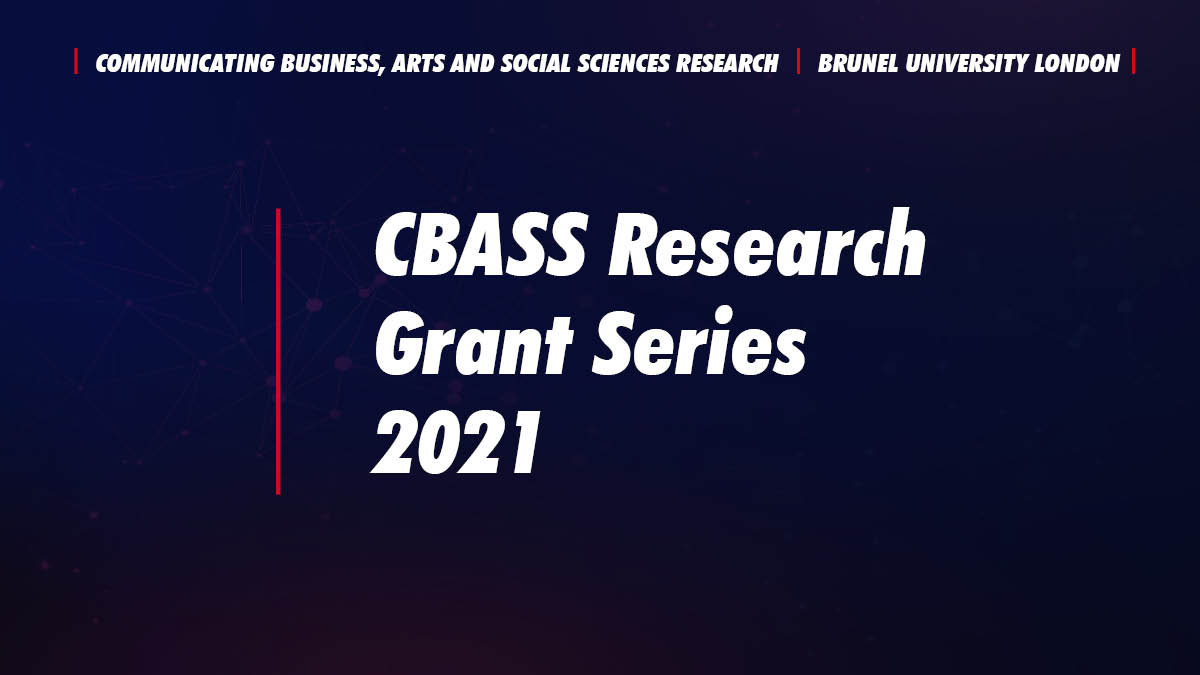
CBASS Research Grant Series 2021
Centre for Entrepreneurship and Sustainability
Centre for Global Lives
|
15:00-16:00 24/03/2021
|
|---|
|
15:00-16:00 07/04/2021
|
|---|
|
A Practical Perspective of Grant Applications
Manoj Dora, Brunel Business School; chaired by Catherine Wang
Event link
|
No Pain, No Gain: How to Turn Rejection to UKRI Grant Success
Ozlem Arda, Asieh Tabaghdehi and Ainurul Rosli, Brunel Business School; chaired by Marios Samdanis
Event link
|
|
14:00-15:00 09/04/2021
|
|---|
|
A Practical Perspective of Grant Applications
Manoj Dora, Brunel Business School; chaired by Catherine Wang
Event link
|
An Introduction to Research Support at Brunel for Researchers*
Vic Gill, Research Support and Development Office
(To obtain login details, please register by email)
|
|
14:00-15:00 14/04/2021
|
|---|
|
A Practical Perspective of Grant Applications
Manoj Dora, Brunel Business School; chaired by Catherine Wang
Event link
|
Management Knowledge Transfer Partnerships*
Gerry O’Hagan, Knowledge Transfer Networks
(To obtain login details, please register your place HERE.)
|
|
10:00-11:00 28/04/2021
|
|---|
|
A Practical Perspective of Grant Applications
Manoj Dora, Brunel Business School; chaired by Catherine Wang
Event link
|
An Introduction to Research Support at Brunel for Researchers*
Vic Gill, Research Support and Development Office
(This is a repeat of the event on 9th April. To obtain login details, please register by email)
|
|
15:00-16:00 28/04/2021
|
|---|
|
A Practical Perspective of Grant Applications
Manoj Dora, Brunel Business School; chaired by Catherine Wang
Event link
|
"Both Sides Now". Inside the Process of Writing a European Grant Application.
Philip Garner, Education; chaired by Andrew Green
Event link
|
|
15:00-16:00 05/05/2021
|
|---|
|
A Practical Perspective of Grant Applications
Manoj Dora, Brunel Business School; chaired by Catherine Wang
Event link
|
A Panel Member’s Dos and Don’ts for AHRC Grant Applications
Tom Betteridge, Vice Provost and Dean College of Business, Arts and Social Sciences; chaired by Catherine Wang
Event link
|
|
15:00-16:00 12/05/2021
|
|---|
|
A Practical Perspective of Grant Applications
Manoj Dora, Brunel Business School; chaired by Catherine Wang
Event link
|
Funding Sources and RSDO Procedures
Giovanna Bono, Research Support and Development Office; chaired by Marios Samdanis
Event link
|
|
15:00-16:00 19/05/2021
|
|---|
|
A Practical Perspective of Grant Applications
Manoj Dora, Brunel Business School; chaired by Catherine Wang
Event link
|
Secrets to Writing a Winning Grant: Maximising Success and Learning from Failures
Lesley Henderson, Social Science and Communications; chaired by Andrew Green
Event link
|
|
15:00-16:00 24/03/2021
|
A Practical Perspective of Grant Applications
Manoj Dora, Brunel Business School; chaired by Catherine Wang
Event link
|
|
15:00-16:00 07/04/2021
|
No Pain, No Gain: How to Turn Rejection to UKRI Grant Success
Ozlem Arda, Asieh Tabaghdehi and Ainurul Rosli, Brunel Business School; chaired by Marios Samdanis
Event link
|
|
14:00-15:00 09/04/2021
|
An Introduction to Research Support at Brunel for Researchers*
Vic Gill, Research Support and Development Office
(To obtain login details, please register by email)
|
|
14:00-15:00 14/04/2021
|
Management Knowledge Transfer Partnerships*
Gerry O’Hagan, Knowledge Transfer Networks
(To obtain login details, please register your place HERE.)
|
|
10:00-11:00 28/04/2021
|
An Introduction to Research Support at Brunel for Researchers*
Vic Gill, Research Support and Development Office
(This is a repeat of the event on 9th April. To obtain login details, please register by email)
|
|
15:00-16:00 28/04/2021
|
"Both Sides Now". Inside the Process of Writing a European Grant Application.
Philip Garner, Education; chaired by Andrew Green
Event link
|
|
15:00-16:00 05/05/2021
|
A Panel Member’s Dos and Don’ts for AHRC Grant Applications
Tom Betteridge, Vice Provost and Dean College of Business, Arts and Social Sciences; chaired by Catherine Wang
Event link
|
|
15:00-16:00 12/05/2021
|
Funding Sources and RSDO Procedures
Giovanna Bono, Research Support and Development Office; chaired by Marios Samdanis
Event link
|
|
15:00-16:00 19/05/2021
|
Secrets to Writing a Winning Grant: Maximising Success and Learning from Failures
Lesley Henderson, Social Science and Communications; chaired by Andrew Green
Event link
|
For further information, please contact CBASS
ESRC Digital Good Network Fellowship
